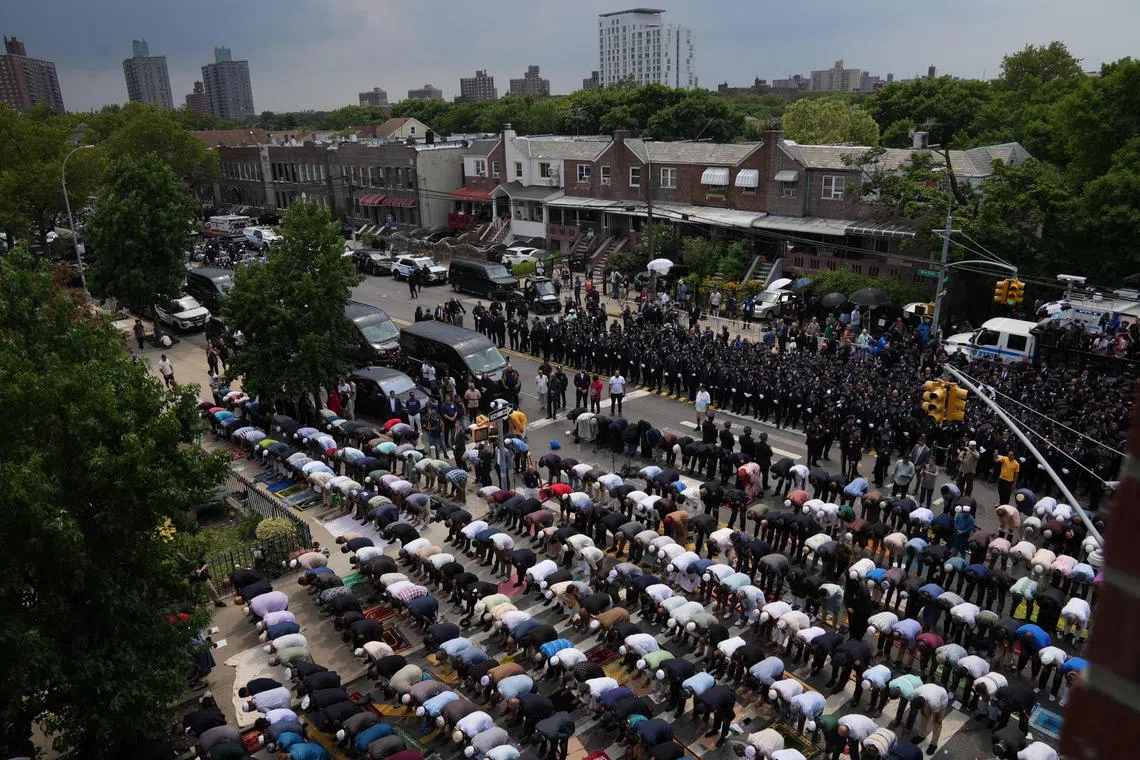A funeral shines a light on the Bangladeshis thriving in the NYPD
Sign up now: Get ST's newsletters delivered to your inbox

The killing of Mr Islam has ripped through the New York Police Department with ferocity.
PHOTO: AMIR HAMJA/NYTIMES
Maia Coleman
Follow topic:
NEW YORK – Inside a three-storey Bronx mosque, dozens of New York City Police Department officers sat cross-legged on the floor. They were silent during a sombre occasion: the funeral of one of their colleagues who had been killed in uniform just days before.
The slain officer, Mr Didarul Islam, was shot on the night of July 28 killing four people.
The killing of Mr Islam, who was awarded a posthumous promotion, has ripped through the Police Department with ferocity. But the death had a particular resonance for the department’s fast-growing community of Bangladeshi American officers. Mr Islam immigrated from Bangladesh about 16 years ago.
In the past decade, the number of Bangladeshi Americans who have flocked to the Police Department’s ranks has exploded, marking the latest chapter in the long story of immigrant groups that have found a home – and a foothold in America – in the nation’s largest police department.
“Being police officers, it’s a way to help the New Yorkers, to help the community,” Sergeant Ershadur Siddique, president of the Bangladeshi American Police Association, said in an interview.
“It’s to show that we are part of America, we are part of New York City, and being a police officer in New York City – it’s known in the world that we’re the best in the world – so it brings pride,” he said.
The association, one of many fraternal organisations within the department, now includes nearly 1,000 of the roughly 34,000 uniformed members of the force.
Among them are an inspector and four captains, as well as 1,500 civilians who work for the department, making it the second-fastest-growing fraternal organisation, according to a spokesperson for the organisation.
Many Bangladeshi Americans have also found work as traffic enforcement agents, a job that Mr Islam often encouraged residents in his Bronx neighbourhood to consider, according to a neighbour.
The Police Department has long served as a harbour for immigrants in New York who are seeking good pay, security and benefits.
Irish Americans for years made up such a large portion of the department’s total personnel, including numerous police commissioners, that they came to stand for the face of the force.
But the department, once known for being overwhelmingly white, has steadily diversified over the decades.
Nearly 12 per cent of its uniformed officers are Asian, a figure closely mirroring the percentage of the city’s total population, according to the US census and Police Department data. About 33 per cent of uniformed officers are Hispanic, and 17 per cent are Black. Among civilian Police Department employees, 17 per cent are Asian and 45 per cent are Black.
The force’s immigrant and minority fraternal groups have also grown in number. Today they include the New York Dominican Officers Organisation, the fastest-growing group, and the Pakistani American Law Enforcement Society, among numerous others.
The Bangladeshi American Police Association was founded in 2015 with a mission of fostering upward mobility within the department, recruiting new officers and building connections with New York City’s Bangladeshi American community, which has nearly tripled to more than 100,000 New Yorkers in the past decade.
Those who are employed by the Police Department founded their fraternal association in part to combat Islamophobia that ran rampant in the United States in the wake of 9/11, according to one of its founders, Mr Shamsul Haque.
It was started to “dispel the misconception that you are Muslim and there is somehow a connection to terrorism,” Mr Haque said on July 30 during a news conference with Mr Zohran Mamdani, the Democratic nominee for mayor.
That mission remained especially resonant on July 28. In the hours after the shooting, there was a torrent of misinformation online declaring the massacre an act of Islamic terrorism and blaming Mr Mamdani, who is Muslim, as was the slain officer.
For many of the association’s members, the officer’s killing has been felt deeply and doubly – the loss of a fellow service member joined with the loss of a compatriot.
“I speak as someone who feels like a family member grieving,” Mr Haque said on July 30 during the news conference. “More than a fellow officer, he was one of us and losing him feels like losing a brother.”
For many in the Bangladeshi American community, Mr Islam’s death has also elicited warring emotions, with officers and civilians saying they feel suspended between pride for his heroism and overwhelming pain at his loss.
“He died in the line of defence. That’s a very honourable death,” said Mr Hossain Mohd, an engineer who is Bangladeshi and came to watch the transfer of Mr Islam’s body from the medical examiner’s office to the Parkchester Jame Masjid on July 29.
“He did something for the country. That’s something to be proud of.”
Officer Mohammad Salam, who grew up with the detective in the same neighborhood in Bangladesh and worked with him years later at the 47th Precinct, was also at the mosque.
After the transfer of Mr Islam’s body, he stood outside its doors in a sea of loved ones and fellow officers and recalled his fallen friend with emotion.
“I’m really proud of him. He was a great kid,” Mr Salam said.
Mr Islam, he said, had embodied the best of the Bangladeshi community in the force.
“They try to help the community; they try to improve their lifestyle,” he said, adding: “They also make their family proud.” NYTIMES

